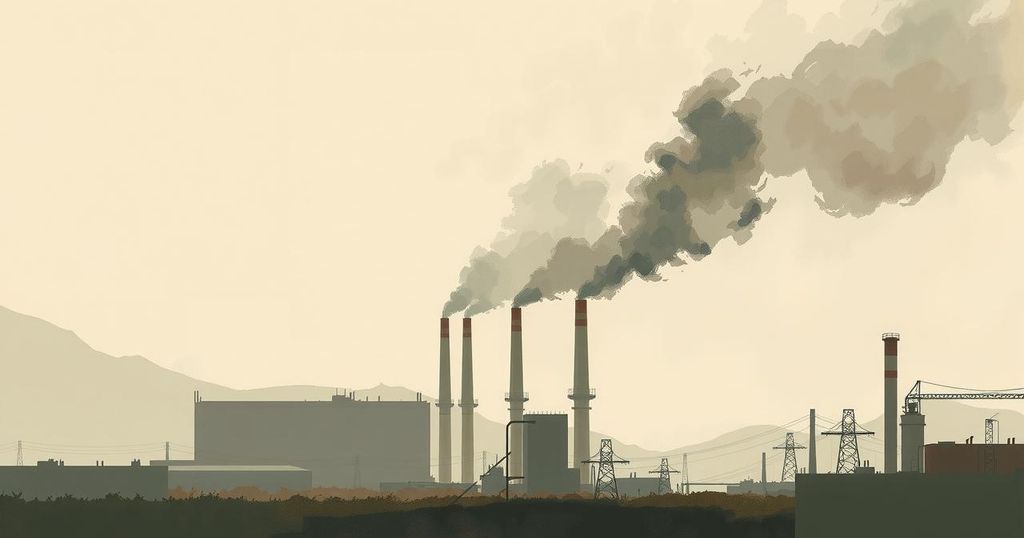Ghana, Nigeria, Chad, Rwanda: Highlights from the 2024 Air Quality Report

The 2024 World Air Quality Report ranks Ghana, Nigeria, Chad, and Rwanda among the most polluted countries globally. Chad leads with PM2.5 concentrations at 91.8 µg/m³, posing severe health risks. Ghana’s air quality has dangerously deteriorated, contributing to a national public health emergency with 28,000 annual deaths attributed to pollution. Urgent action is necessary to curb this crisis.
The 2024 World Air Quality Report indicates a troubling rise in pollution levels across Africa, with Ghana, Nigeria, Chad, and Rwanda listed among the world’s most polluted nations. This report underlines a severe air quality crisis that significantly jeopardizes public health, affecting millions of people across the continent.
Chad leads the global rankings with a PM2.5 concentration of 91.8 µg/m³, which is approximately 18 times higher than the World Health Organization’s (WHO) recommended limit of 5 µg/m³. Nigeria ranks 11th with 40.1 µg/m³, followed closely by Rwanda at 9th with 40.8 µg/m³, and Ghana stands at 14th place with 35.8 µg/m³. These particulate matter concentrations are particularly hazardous, as PM2.5 particles can penetrate deep into the lungs and bloodstream, causing serious health issues.
The University of Chicago reports that air pollution reduces life expectancy in heavily polluted regions by 2.7 years. It was estimated by WHO in 2019 that 28,000 deaths in Ghana annually are attributed to air quality issues. Globally, air pollution is responsible for around 8.1 million deaths per year, equating to roughly 22,192 daily fatalities, with one child succumbing every minute due to polluted air.
Ghana’s air pollution levels are now seven times above the WHO safety guidelines. Accra has been rated the 16th most polluted capital globally, with a PM2.5 level of 36.3 µg/m³. Notably, Kumasi has emerged as the most polluted city in Ghana for the first time, reporting PM2.5 levels at 39.5 µg/m³.
Ghana’s trajectory of worsening pollution has been alarming. In recent years, the country’s PM2.5 levels have spiked significantly, moving from 27th place in 2022 with 30.2 µg/m³ to 14th place in 2024 with 35.8 µg/m³. In tandem, 34% of African cities noted PM2.5 levels that are three to five times beyond the WHO guideline.
The air quality crisis in Africa is exacerbated by inadequate monitoring capabilities, with only 24 out of 54 countries able to report pollution data. Additionally, public health officials recognize air pollution as a national emergency, with WHO projections suggesting one death every 19 minutes in Ghana due to toxic air exposure. If these trends persist, monthly fatalities could reach 2,333 people.
Furthermore, the economic toll of this air quality crisis can be staggering. A Clean Air Fund report warns that by 2040, the burden of air pollution could send Ghana’s urban economy into a $137.8 billion financial deficit. This urgent matter calls for immediate remedial actions.
Despite only 17% of global cities meeting the WHO’s air quality standards, certain regions maintain cleaner air. The report notes that while countries like Australia and New Zealand showcase acceptable PM2.5 levels, the overwhelming majority, including those in Africa, struggle with severe air quality issues driven by urbanization, population growth, and industrial emissions.
Urgent actions are necessary for Ghana to mitigate air pollution. Experts advocate for stricter vehicle emission regulations, investments in renewable energy, improved monitoring frameworks, and strict enforcement of anti-burning policies. As Ghana now rates among the top 15 most polluted countries, immediate intervention is imperative to prevent further health and environmental crises.
The 2024 World Air Quality Report alarmingly illustrates the severe pollution levels in Ghana and other African nations. With PM2.5 concentrations far exceeding safe limits, these countries are facing a public health crisis that could result in thousands of premature deaths annually. The situation demands immediate action to improve air quality and protect citizen health. Effective regulations, investments in renewable energy, and enhanced monitoring systems will be vital to address this pressing issue.
Original Source: www.myjoyonline.com








